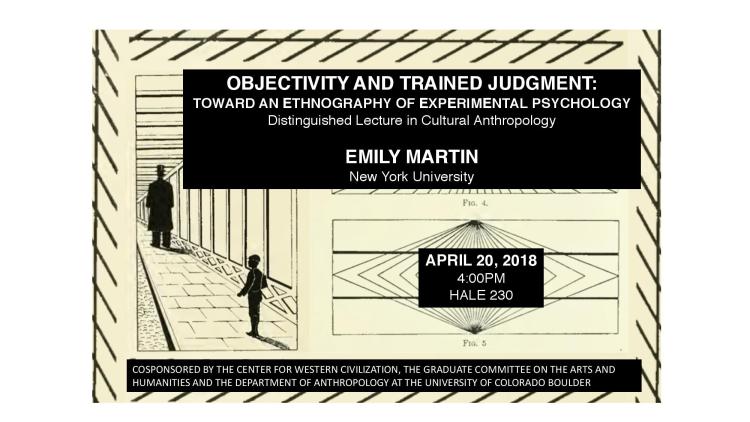 The Department of Anthropology, the Center for Western Civilization, Thought and Policy and the Graduate Committee on the Arts and Humanities present "Objectivity and Trained Judgement: Toward an Ethnography of Experimental Psychology" on April 20th, 2018 at 4:00 P.M. in Hale 230. This distinguished lecture in cultural anthropology is given by Emily Martin, Professor Emerita, New York University.
The Department of Anthropology, the Center for Western Civilization, Thought and Policy and the Graduate Committee on the Arts and Humanities present "Objectivity and Trained Judgement: Toward an Ethnography of Experimental Psychology" on April 20th, 2018 at 4:00 P.M. in Hale 230. This distinguished lecture in cultural anthropology is given by Emily Martin, Professor Emerita, New York University.
The findings of experimental psychology play a major role in mass media accounts of human behavior today. Some scholars have argued that psychological research enhances a view of humans as isolated, asocial individuals. Historians of psychology have traced this view to the mid 20th century eradication of what was called “introspection” in early German psychology, in pursuit of ‘objective’ methods. In this talk I take a fresh look at the years before this process was complete -- from the vantage point of early ethnographic and psychological field expeditions. Focusing on the psychological research conducted during and after the Cambridge Anthropological Expedition to the Torres Straits Islands (CAETS) in 1898, I will discuss the importance of the CAETS in the history of anthropology and psychology and explore some ways psychology and anthropology shared methods early in their development. I will ask whether there are hidden spaces in contemporary experimental psychology where its older concerns for “Introspection” --the experience of experimental subjects -- dovetail with the concerns of ethnographic approaches in anthropology.
Results
Dr. Martin discussed the concept of “introspection,” developed in early German psychology, and how it came to be replaced in the mid-20th century as the discipline of psychology shifted toward the pursuit of objective methods. She also discussed her recent historical research on the psychological experiments conducted during and after the Cambridge Anthropological Expedition to the Torres Straits Islands in 1898, and the significance of this work for the development of the disciplines of anthropology and psychology. Out of 70 attendees at the lecture, 20 were students.
In addition to the lecture, Dr. Martin also hosted a public workshop where she discussed her career trajectory and current project in a more informal way. A total of 19 people attended the workshop, 7 were students. The workshop addressed themes of history, anthropology, and psychology. Dr. Martin also interacted with the workshop attendees, offering feedback on their scholarly projects. Many faculty members and graduate students had the opportunity to interact with Dr. Martin at the workshop, lecture, lunch, and reception, and to have one-on-one discussions about areas of shared interest. It is likely that this will lead to collaboration on panel organization at one of the future annual meetings of the American Anthropological Association, the most important conference in our field. The support from the CWC was invaluable in facilitating this wonderful event and the lasting professional connections it enabled for our department and around the university.
The Center for Western Civilization, Thought and Policy funds research and educational initiatives that contribute to critical reflection on the development of Western civilization. All CU Boulder faculty and students are eligible to apply. If you are interested in applying for a CWCTP faculty grant, deadlines are rolling throughout the year.
